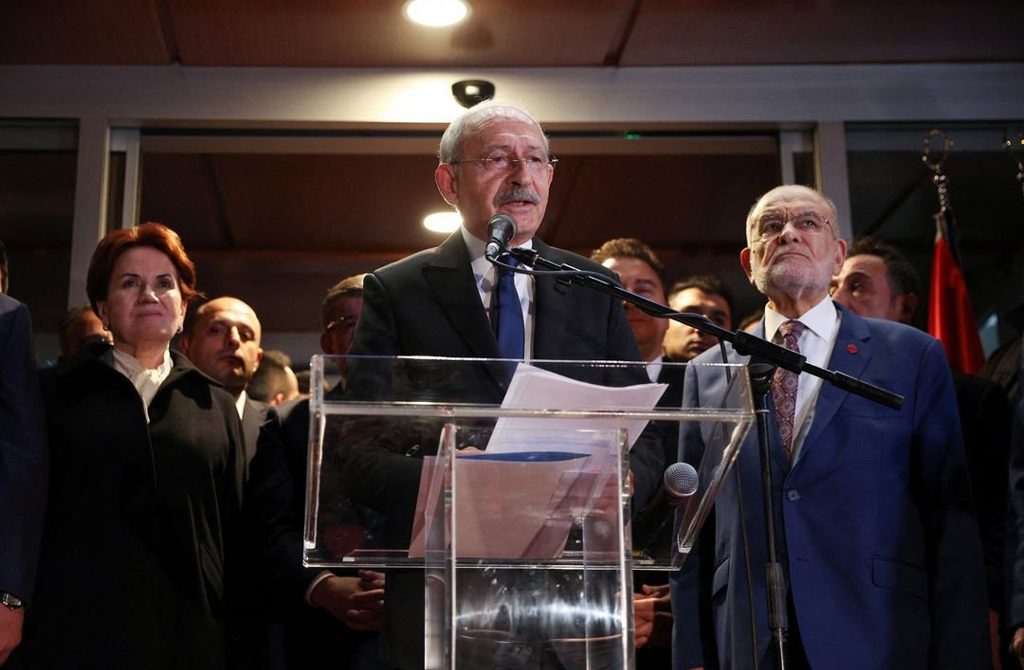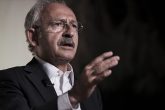With just seven months left until Türkiye’s local elections, the opposition remains focused on assigning blame for their election defeat. One might argue that properly reflecting on what happened in May 2023 would benefit the new alliance model. Yet, commentators close to the main opposition Republican People’s Party (CHP) make accusations against the alliance’s right-wing members, whose spokespeople make negative remarks about the alliance – which hardly amounts to meaningful analysis. If anything, the current debate threatens to alienate non-ideological voters, whom the opposition attempted to win over to secure a simple majority.
The leadership battle within the CHP fuels those discussions as right-wing members of the opposition bloc appear to chart a new course for themselves. Whereas the Good Party (IP) is expected to unveil its plans today, the remaining parties – the Democracy and Progress Party (DEVA), Future Party (GP) and Felicity Party (SP) – are still trying to reject the charge of opportunism. In other words, they are in no position to stop playing defense and start developing policy alternatives.
More importantly, the far-right Victory Party’s (ZP) Chairperson Ümit Özdağ, who endorsed CHP Chairperson Kemal Kılıçdaroğlu in the presidential election’s second round, has been targeting all opposition parties, including the CHP. Step by step, various allegations – that some party’s members did not vote for the opposition candidate, that no opposition movement could possibly win alone, that the opposition bloc suffers from disloyalty, narrow ideological perspectives, secret protocols and nationalism – undermine the opposition’s alliance. The perception that joining forces with the CHP weakened all opposition parties, including the CHP itself, becomes entrenched thanks to the opposition’s own propaganda.
In President Recep Tayyip Erdoğan’s words: “Since the election, we have been reminded every single day that our country was on the verge of a cliff. (The opposition) hid countless betrayals and dirty deals. As the Pandora’s box opens, the true face of those, who used to lecture everyone on political ethics, comes into the light. I don’t want to imagine what the CHP, which handed over 38 parliamentary seats to (a group of fringe parties) with less than 1% of the vote, may have promised to terrorist organizations.”
ZP: Unacceptable ally for ‘table’
But why did the opposition bloc dig itself into this hole? Obviously, the main reasons include losing the May 2023 elections (for which the opposition campaigned with great ambition) and the resulting disappointment among the CHP and IP ranks. That Kılıçdaroğlu imposed his candidacy on the alliance and IP Chair Meral Akşener briefly left the bloc provides both parties with rhetorical ammunition.
I would say that assigning blame for what happened after May 14 is the most challenging part because the opposition parties haven’t actually discussed the second round’s impact on the current crisis. Özdağ’s attacks against Kılıçdaroğlu’s alliance have been more effective than many realize. One might think of those statements by a political party, which endorsed the opposition candidate in the second round, as part of the opposition’s self-criticism. It is important to recall, however, that the ZP was an ally that the “table for six” could not quite accept.
The main problem with the opposition bloc is the CHP’s inability to lead it effectively because it doesn’t want to pay the price for leadership. Kılıçdaroğlu’s attempt to transform the main opposition party has been rejected by the CHP’s organization, base and commentators as “embracing the right” and “abandoning secularism.” Specifically, they believe that Kılıçdaroğlu’s bargain was essentially unfair – although partnering with CHP was no easy decision for the IP, the Green Left Party (YSP), DEVA, the GP, or the SP. Indeed, each of those movements lost some popular support because of their alliance with CHP.
That is how alliances work. Not all supporters of all parties automatically get behind the joint candidate – an uneasy truth that the Nation Alliance’s members refuse to acknowledge.
Ahead of next year’s municipal elections, the non-CHP opposition needs to make a critical decision. They will face criticism designed to force them to partner with the CHP anew. At the same time, they will drive a hard bargain in some provinces but not fielding their candidates effectively hurts the relevant parties. By the same token, not contesting mayoral races next year would represent a serious challenge to the YSP, IP, DEVA, GP, and SP.
Perfectly capable of assessing the level of the opposition’s fragmentation, Erdoğan delivered the following message to voters at the 22nd anniversary of the Justice and Development Party’s (AK Party) establishment: “If you’re looking for a party and alliance that respects all 85 million citizens and which you can hold accountable, come and join the AK Party and the People’s Alliance.”
In this article
- Opinion
- 2024 Turkish Local Elections
- Kemal Kılıçdaroğlu
- Meral Akşener
- Turkish Opposition
- Türkiye's Good Party (IP)
- Türkiye's Good Party (IP) Chairperson
- Türkiye's Peoples' Democratic Party (HDP)
- Türkiye's Republican People's Party (CHP)
- Türkiye's Republican People’s Party (CHP) Chairperson
- Türkiye's Victory Party (ZP)
- Türkiye's Victory Party (ZP) Chairperson
- Ümit Özdağ



